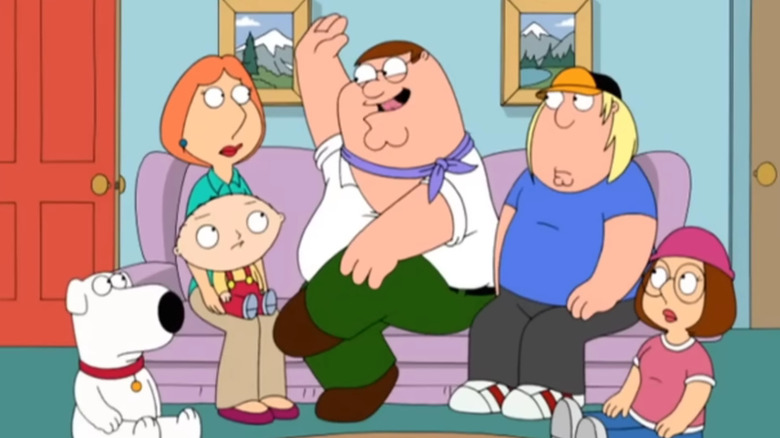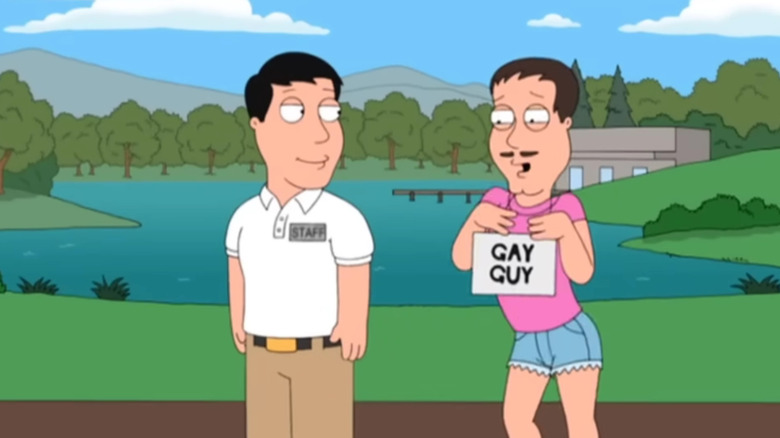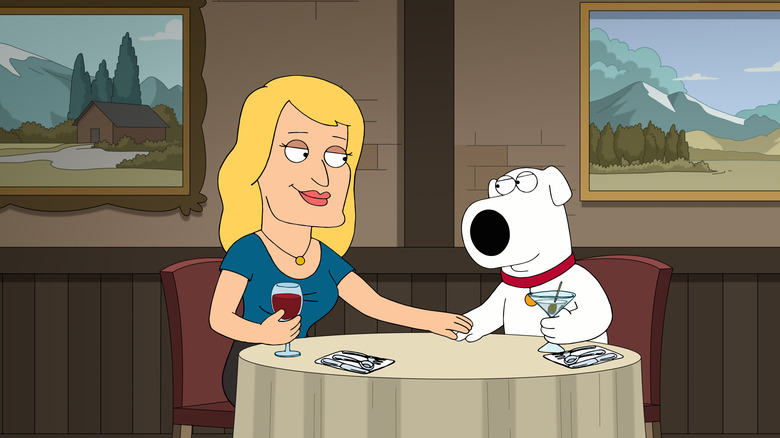Why Family Guy Phased Out Certain Controversial Jokes
One of the trickiest ongoing debates in the comedy business concerns how exactly to evolve with the times. For some comedians and comedy writers, moving away from certain jokes means you're "appeasing the woke mob" (see also: the controversy around Dave Chappelle's more recent comedy specials), whereas for others, finding the ever-shifting line of what's deemed acceptable is part of the fun. Straddling the line is an impressive skill; barging straight past the line is easy, and sort of boring.
Although this culture-wide debate over comedic boundaries usually centers around stand-up comedians, animated sitcoms often end up in the middle of it too. For instance, "The Simpsons" spurred a round of outrage in 2023 when Homer made a throwaway joke about no longer strangling his son Bart. "I don't do that anymore. Times have changed," Homer says. The actual joke is that strangling your child wasn't considered socially acceptable in the '90s either, but some people interpreted it as a serious declaration from the show that it wouldn't do the gag anymore. Never mind that Homer was seen strangling Bart again just two episodes later.
"Family Guy" sparked a similar round of outrage with a throwaway line in the 2019 episode "Trump Guy," where Peter says the show has "been trying to phase out the gay [jokes]." That one quote ended up in the headlines of seemingly every major publication in the weeks that followed. Like with the outrage over the supposed decline in cartoon child abuse on "The Simpsons," though, most of the backlash here came from people who don't watch the show regularly anymore; if they did, they'd know that the gay jokes on "Family Guy" have hardly stopped. But although it's easy to make fun of the faux-outrage over "Family Guy" going "woke," there was some truth to what Peter said.
Family Guy hasn't fully phased out the gay jokes, but they have indeed evolved over the years
When asked in a 2019 interview with TV Line if "Family Guy" was really phasing out the gay jokes, executive producer Alec Sulkin answered, "Kind of, yes. If you look at a show from 2005 or 2006 and put it side by side with a show from 2018 or 2019, they're going to have a few differences. Some of the things we felt comfortable saying and joking about back then, we now understand is not acceptable."
Executive producer Rich Appel added, "It's not us reacting and thinking, 'They won't let us [say certain things].' No, we've changed too. The climate is different, the culture is different, and our views are different. They've been shaped by the reality around us, so I think the show has to shift and evolve in a lot of different ways."
Sure enough, the gay jokes of later-season "Family Guy" are a bit less crass than the gay jokes of early "Family Guy." In an episode like "Customer of the Week" in season 19, the gay joke of the episode is that an increasingly-out-of-control Lois is surprised that one of the guys she's kidnapped is gay but the other one isn't, even though they live together. ("Fine, you win with your gay stuff!" she says.) The joke here is mostly that Lois sucks, and also that it's ridiculous she'd be quibbling over this issue given the stakes of the situation.
Meanwhile, there's the 2009 episode "Family Gay," where Peter turns gay for an episode. One of the jokes here involves a conversion therapy camp counselor giving the campers baseball bats to beat up "Harry the Homosexual." With the gay campers taking the bats and walking off-screen towards Harry, the counselor yells, "No, don't use the bats like that! No, don't use the bats like that either!" The whole episode is a crass, cartoonish depiction of gay men, so it's no surprise that it didn't win any GLAAD awards that year.
And yet, it's hard to get too mad at "Family Gay." Not only is the episode's central message that gay people should be fully accepted for who they are, a position that wasn't considered a safe one at the time by any stretch, but all the crass gay jokes are done with a heavy amount of irony. The episode knows that most gay men aren't actually having 11-ways most of the time, and it trusts its audience to understand the same. For the most part "Family Gay" depicts gay people as silly but harmless, whereas the conversion camp counselor is depicted with genuine scorn. When the counselor yells at the gay campers to stop using the bats in that way, it's not just a cheap gay joke; it's also a scene where the gays triumph in the face of hatred, rubbing the counselor's face in the futility of his mission. (At least, that's my optimistic take on the scene's subtext.)
You could also argue that all the gay jokes helped make the episode more persuasive to homophobic viewers, lulling them into a false sense of security before hitting them with the pro-gay rights closing message. A lot of people will outright reject an episode's social commentary if it feels too much like a lecture, but for most of its runtime "Family Gay" definitely doesn't feel like one.
Family Guy is slightly nicer than it gets credit for, but that's not saying much
The old gay jokes on "Family Guy" are helped by the fact the show's creator, Seth MacFarlane, is a total lib, and he's been unabashedly pro-gay rights from day one. He spent a lot of the 2000s trash-talking conservative groups for their anger over his show's pro-LGBTQ+ commentary, and unlike so many other famous comedians, he hasn't had a sudden right-wing heel turn in the years since.
What also helps is that "Family Guy" has gotten a bit nicer over the years. The bullying of Meg has declined significantly — the show's COVID PSA video notwithstanding — and there are far less cutaways that are solely about making fun of female celebrities' appearance. In fact, the show's grown fond of subverting expected cruelty with surprisingly wholesome punchlines; take the season 18 moment where Joe makes a hacky joke in the middle of a hostage situation, and instead of making fun of him Peter responds by thanking him for bringing joy into his life:
The much trickier conversation about "Family Guy" involves how its jokes about trans people have definitely not been phased out over the years, no matter how you defining "phasing out." Season 8's "Quagmire's Dad," for instance, centers around the trans character Ida and her coming out journey, and it nearly makes it to the finish line without much issue. But then, of course, the show had to end with a joke about Brian accidentally sleeping with a trans woman, and then he vomits for 30 straight seconds after realizing this.
If I wanted to be super charitable I could say that the sheer length of his vomiting was a self-aware mockery of the hateful vomit gag films often do around trans characters (watch the documentary "Disclosure" for more on that), but I'm just not convinced that was the episode's intention. (It doesn't help that transphobic viewers sure love that joke and praise the series for it.) Were there worse instances of transphobia in '90s/'00s-era TV than this? Sure (see this episode of "Friends"), but that's hardly a good defense here.
To be fair to MacFarlane, who didn't write the episode but did voice most of the characters involved, Ida became a recurring character on the show and is often written with sympathy and some complexity, even if she still has to put up with throwaway jokes that feel like they were written by Ron DeSantis. "The intent of the 'Family Guy' episode was to show that Quagmire's father was still a war hero and still someone that he could look up to and respect," MacFarlane said in a 2022 interview with The Hollywood Reporter. "That episode was written by Steve Callaghan, a writer on 'Family Guy,' who had the same experience with his own parent — his father had transitioned to a woman — and he was writing, in many ways, from his own experience."
It helps that MacFarlane later handled a trans allegory in the surprisingly great third season of his sci-fi TV show "The Orville" with a lot of kindness and nuance. MacFarlane rejected the idea that the episode was any sort of apology for "Family Guy," however. "'The Orville' just requires a different kind of storytelling, and to be blunt, I enjoy it more. I've never enjoyed a writing process more than I have on this show," he explained.


